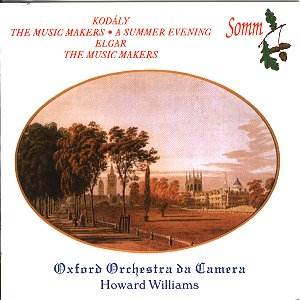Full marks if you knew that Kodaly set The Music
Makers. It was written for performance in Merton College, Oxford
in 1964 and Kodaly, who was a frequent visitor to England (the BBC taped
him conducting his own work with the LSO and others in the 1960s), was
now eighty-one. The setting is for chorus, brass and strings and first
performed in the College Chapel on June 1st 1964 by the Kodaly
Choir, and members of the Collegium Musicum Oxoniense and the Bath Festival
Orchestra. They were conducted by Laszlo Heltay, one of the composerís
Hungarian pupils.
After a slightly raw start from the brass the lyrical
unison invocation of OíShaughnessyís poem leads to harmonically rich
layers. The opening sounds very English and not just because the setting
is in English Ė the unison passage especially so. The increase in harmonic
interest and complexity mirrors the poem, underpinned by some structurally
supportive brass figures. The developing richness of the choral writing
is an especially atmospheric one and ends in the restatement of the
opening lines, inflected now with far greater complexity, and concluding
in final, taxing high notes which are well sustained by the choir and,
in terms of the setting, convey the sense of the distance come. Hardly
a masterpiece but a sensitive setting and it would have been good if
Somm had individually tracked it as they do the Elgar.
A Summer Evening was written in 1929/20 and
premiered by Toscanini and the Philharmonic Symphony Orchestra of New
York in April 1930. Itís a lyrical and pastoral eighteen-minute work
and a fairly compact sonata structure. The orchestra copes well with
it, balancing well and despatching some tricky sounding horn writing
with something approaching aplomb. The agitated central sections of
the work are well integrated by Howard Williams as well and they make
a cohesive case for this slight work. The Elgar performance was received
by the St Johnís audience with some enthusiastic cheers. Mezzo Christina
Wilson makes a promising debut on disc. She has a resonant and strongly
shaped voice and conveys the nostalgia and intimacy of the music with
considerable awareness. The orchestra respond well to the score, not
underlining the composerís self-borrowings to an unnecessary degree.
The whole concert was prefaced by comments from Madame Kodaly who made
an evocative speech.
Jonathan Woolf


